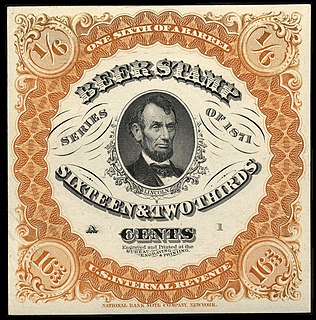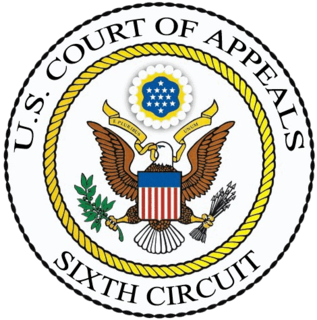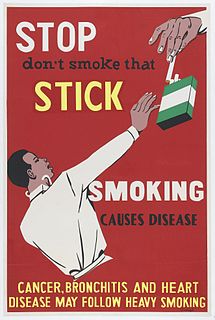Related Research Articles
Excise tax in the United States is an indirect tax on listed items. Excise taxes can be and are made by federal, state and local governments and are not uniform throughout the United States. Some excise taxes are collected from the producer or retailer and not paid directly by the consumer, and as such often remain "hidden" in the price of a product or service, rather than being listed separately.

A spendthrift trust is a trust that is created for the benefit of a person that gives an independent trustee full authority to make decisions as to how the trust funds may be spent for the benefit of the beneficiary. Creditors of the beneficiary generally cannot reach the funds in the trust, and the funds are not actually under the control of the beneficiary.
The Tobacco Master Settlement Agreement (MSA) was entered in November 1998, originally between the four largest United States tobacco companies and the attorneys general of 46 states. The states settled their Medicaid lawsuits against the tobacco industry for recovery of their tobacco-related health-care costs. In exchange, the companies agreed to curtail or cease certain tobacco marketing practices, as well as to pay, in perpetuity, various annual payments to the states to compensate them for some of the medical costs of caring for persons with smoking-related illnesses. The money also funds a new anti-smoking advocacy group, called the Truth Initiative, that is responsible for such campaigns as Truth and maintains a public archive of documents resulting from the cases. Study of this archive revealed the "tobacco industry playbook" and its parallels with techniques used in climate change denial.
Grand River Enterprises (GRE) is a privately owned tobacco manufacturer and distributor located on the Six Nations of the Grand River Reserve in the province of Ontario. It sells cigarettes under the brand names Sago, Putters, DK's, Ménage, Oakdale and Golden Leaf in Canada and Seneca, Opal and Couture in the United States.

An excise, or excise tax, is any duty on manufactured goods that is levied at the moment of manufacture rather than at sale. Excises are often associated with customs duties ; customs are levied on goods that come into existence – as taxable items – at the border, while excise is levied on goods that came into existence inland.

The Division of Alcoholic Beverages and Tobacco (ABT) is the Florida state government agency which licenses and regulates the sale of alcoholic beverages and tobacco. It is part of the Florida Department of Business and Professional Regulation (DBPR).
Altria Group v. Good, 555 U.S. 70 (2008), was a United States Supreme Court case in which the Court held that a state law prohibiting deceptive tobacco advertising was not preempted by a federal law regulating cigarette advertising.

In the United States cigarettes are taxed at both the federal and state levels, in addition to any state and local sales taxes and local cigarette-specific taxes. Cigarette taxation has appeared throughout American history and is still a contested issue today.

Tobacco politics refers to the politics surrounding the use and distribution of tobacco.

A.D. Bedell Wholesale Co., Inc. v. Philip Morris Inc., 263 F.3d 239, was an early appellate case testing the legality of the Tobacco Master Settlement Agreement (MSA), in this instance whether it could properly be alleged to violate the Sherman Antitrust Act.

Tritent International Corp. v. Commonwealth of Kentucky, 467 F.3d 547, is a US antitrust law case decided by the Court of Appeals on the Sixth Circuit. The case is notable, inter alia, because it provides a summary of the difficult terms of the Tobacco Master Settlement Agreement.
The Tobacco Master Settlement Agreement (MSA) with Alabama is the particular version of the Tobacco MSA that was signed by Alabama, enabled by means of legislation in Alabama, and has been interpreted since then in Alabama courts.

Smoking in Nigeria is prohibited in public places and is punishable by a fine of not less than N200 and not exceeding N1000 or to imprisonment to a term of not less than one month and not exceeding two years or to both a fine and imprisonment.
Tobacco is an agricultural product acting as a stimulant triggering complex biochemical and neurotransmitter disruptions. Its main ingredient is nicotine and it is present in all cigarettes. Early tobacco usage was for medical cures and religious purposes. In the 1990s, cigarette usage became increasingly popular when it was sold in mass amounts. The popularity of smoking increased and in 1964, the Surgeon General of the United States wrote a report concerning the dangers of cigarette smoking. In the United States, for the past 50 years efforts have been made so that the public should be aware of the risks of tobacco usage.
The Supremacy Clause of the Constitution of the United States, establishes that the Constitution, federal laws made pursuant to it, and treaties made under its authority, constitute the "supreme Law of the Land", and thus take priority over any conflicting state laws. It provides that state courts are bound by, and state constitutions subordinate to, the supreme law. However, federal statutes and treaties are supreme only if they do not contravene the Constitution.

The Cigarettes and Other Tobacco Products Act, 2003 or COTPA, 2003 is an Act of Parliament of India enacted in 2003 to prohibit advertisement of, and to provide for the regulation of trade and commerce in, and production, supply and distribution of cigarettes and other tobacco products in India.
Regulation of electronic cigarettes varies across countries and states, ranging from no regulation to banning them entirely. For instance, e-cigarettes were illegal in Japan, which forced the market to use heat-not-burn tobacco products for cigarette alternatives. Others have introduced strict restrictions and some have licensed devices as medicines such as in the UK. However, as of February 2018, there is no e-cigarette device that has been given a medical license that is commercially sold or available by prescription in the UK. As of 2015, around two thirds of major nations have regulated e-cigarettes in some way. Because of the potential relationship with tobacco laws and medical drug policies, e-cigarette legislation is being debated in many countries. The companies that make e-cigarettes have been pushing for laws that support their interests. In 2016 the US Department of Transportation banned the use of e-cigarettes on commercial flights. This regulation applies to all flights to and from the US. In 2018, the Royal College of Physicians asked that a balance is found in regulations over e-cigarettes that ensure product safety while encouraging smokers to use them instead of tobacco, as well as keep an eye on any effects contrary to the control agencies for tobacco. A recent study shows electronic device company "JUUL" contains carcinogens and other harmful ingredients inside their e-juice cartridges.

Radiation Control for Health and Safety Act of 1968 was an amendment to the Public Health Service Act mandating performance standards for electronic products suspectible of electromagnetic radiation or radiation emissions. The United States statute established provisions involving research and development programs for the studies of electromagnetic shielding, ionizing radiation, non-ionizing radiation, and exposure assessment to humans.

Mighty Corporation is a Filipino corporation and was the second largest cigarette manufacturer in the Philippines from 2010 to 2017. On September 8, 2017, Japan Tobacco acquired Mighty Corporation's cigarette business in the amount of P46.8 billion, paving the way for the full payment of P30 billion to the Philippine government as part of the agreement for Mighty Corporation to settle its unpaid tax liabilities.

Excise stamps of Russia are a kind of Russian revenue stamps. They were issued according to the governmental order of the Russian Federation. On 14 April 1994 they adopted resolution number 319 "Introduction of excise stamps in the Russian Federation". Certain goods produced in Russia or imported to the territory of Russia are subject to excise tax including:
References
The contents of this article have been adapted from a public domain document, Freedom Holdings Inc. v. Spitzer, 357 F.3d 205 (2nd Cir. 2004).
- ↑ See State v. Philip Morris, Inc., 179 Misc. 2d 435, 686 N.Y.S.2d 564 (N.Y. Sup. Ct. 1998)
- ↑ See 179 Misc.2d at 451.
- ↑ See MSA at 15-37
- ↑ Receipt of settlement payments is allocated among the Settling States pursuant to a protocol set forth in Exhibit U to the MSA.--see MSA at 46-48,
- ↑ see MSA at 11-12, 93-101
- ↑ MSA at 9, 13.
- ↑ See MSA at 47-48.
- ↑ See MSA at 48.
- ↑ See MSA at 48 & Exhibit E.
- ↑ See MSA at 46-47.
- ↑ See MSA at 62-63.
- ↑ MSA at 49-52.
- ↑ see MSA at 49,
- ↑ See MSA at 50.
- ↑ attached to the MSA, see MSA at 53 & Exhibit B
- ↑ See N.Y. Pub. Health Law § 1399-nn to 1399-pp (2002).
- ↑ see N.Y. Pub. Health Law § 1399-pp(1)
- ↑ see N.Y. Pub. Health Law § 1399-pp(2). New York's Escrow Statute provides in part as follows:
- Any tobacco product manufacturer selling cigarettes to consumers within the state (whether directly or through a distributor, retailer or similar intermediary or intermediaries) after the effective date of this article shall do one of the following:
- 1. become a participating manufacturer (as that term is defined in section II(jj) of the master settlement agreement) and generally perform its financial obligations under the master settlement agreement; or
- 2. (a) place into a qualified escrow fund by April fifteenth of the year following the year in question the following amounts (as such amounts are adjusted for inflation):
- (i) 1999: $ . 0094241 per unit sold after the effective date of this section;
- (ii) 2000: $ . 0104712 per unit sold;
- (iii) for each of 2001 and 2002: $ . 0136125 per unit sold;
- (iv) for each of 2003 through 2006: $ . 0167539 per unit sold;
- (v) for each of 2007 and each year thereafter: $ . 0188482 per unit sold.
- (b) a tobacco product manufacturer that places funds into escrow pursuant to paragraph (a) shall receive the interest or other appreciation on such funds as earned. Such funds themselves shall be released from escrow only under the following circumstances:
- (i) to pay a judgment or settlement on any released claim brought against such tobacco product manufacturer by the state or any releasing party located or residing in the state. Funds shall be released from escrow under this subparagraph: (A) in the order in which they were placed into escrow and (B) only to the extent and at the time necessary to make payments required under such judgment or settlement;
- (ii) to the extent that a tobacco product manufacturer establishes that the amount it was required to place into escrow in a particular year was greater than the state's allocable share of the total payments that such manufacturer would have been required to make in that year under the master settlement agreement (as determined pursuant to section IX(i)(2) of the master settlement agreement, and before any of the adjustments or offsets described in section IX(i)(3) of that agreement other than the inflation adjustment) had it been a participating manufacturer, the excess shall be released from escrow and revert to such tobacco product manufacturer; or
- (iii) to the extent not released from escrow under subparagraph (i) or (ii) of this paragraph, funds shall be released from escrow and revert to such tobacco product manufacturer twenty-five years after the date on which they were placed into escrow.
- Any tobacco product manufacturer selling cigarettes to consumers within the state (whether directly or through a distributor, retailer or similar intermediary or intermediaries) after the effective date of this article shall do one of the following:
- ↑ Freedom Holdings Inc. v. Spitzer, 357 F.3d 205 (2nd Cir. 2004)
- ↑ N.Y. Tax Law § 480-b(1).
- ↑ N.Y. Tax Law § 480-b(2).
- Section 480-b provides in its entirety as follows:
- § 480-b. Prohibition against the stamping of certain cigarettes
- 1. Every tobacco product manufacturer as defined by section thirteen hundred ninety-nine-oo of the public health law whose cigarettes are sold for consumption in this state shall annually certify under penalty of perjury that, as of the date of such certification, such tobacco product manufacturer: (a) is a participating manufacturer as defined in subdivision one of section thirteen hundred ninety-nine-pp of the public health law; or (b) is in full compliance with subdivision two of section thirteen hundred ninety-nine-pp of the public health law. Such certification shall be executed and delivered to the commissioner, the attorney general and any agent who affixes New York state cigarette tax stamps to cigarettes of such tobacco product manufacturer, no earlier than the sixteenth day of April and no later than the thirtieth day of April of each year, and shall be accompanied by a list setting forth each of the cigarette brands of such tobacco product manufacturer sold for consumption in New York state. Agents shall retain such certifications for a period of five years.
- 2. An agent may not affix, or cause to be affixed, a New York state cigarette tax stamp to a package of cigarettes if either: (a) the tobacco product manufacturer of such cigarettes has not provided such agent with the certification required by subdivision one of this section; or (b) the commissioner has notified such agent that such tobacco product manufacturer is in violation of section thirteen hundred ninety-nine-pp of the public health law, or has filed a false certification under subdivision one of this section, and such agent has not been notified by the commissioner that such violation has ceased.
- 3. The commissioner shall prescribe the form of the certification required to be filed pursuant to subdivision one of this section.
- Section 480-b provides in its entirety as follows:
- ↑ N.Y. Tax Law § 1846(a), (a-1)
- 8 Section 1846 provides, in pertinent part, as follows:
- § 1846. Seizure and forfeiture of cigarettes
- (a) Whenever a police officer designated in section 1.20 of the criminal procedure law or a peace officer designated in subdivision four of section 2.10 of such law, acting pursuant to his or her special duties, shall discover any cigarettes subject to tax provided by article twenty of this chapter or by chapter thirteen of title eleven of the administrative code of the city of New York, and upon which the tax has not been paid or the stamps not affixed as required by such article or such chapter thirteen, they are hereby authorized and empowered forthwith to seize and take possession of such cigarettes, together with any vending machine or receptacle in which they are held for sale. Such cigarettes, vending machine or receptacle seized by a police officer or such peace officer shall be turned over to the commissioner. Such seized cigarettes, vending machine or receptacle, not including money contained in such vending machine or receptacle, shall be forfeited to the state. . . .
- (a-1) Whenever a police officer designated in section 1.20 of the criminal procedure law or a peace officer designated in subdivision four of section 2.10 of such law, acting pursuant to his or her special duties, shall discover any cigarettes which have been stamped in violation of section four hundred eighty-b of this chapter, such officer is hereby authorized and empowered forthwith to seize and take possession of such cigarettes, and such cigarettes shall be subject to a forfeiture action pursuant to the procedures provided for in article thirteen-A of the civil practice law and rules, as if such article specifically provided for forfeiture of cigarettes seized pursuant to this section as a preconviction forfeiture crime. Subdivisions (b), (c) and (d) of this section shall not apply to cigarettes seized pursuant to this subdivision.
- § 1846. Seizure and forfeiture of cigarettes
- 8 Section 1846 provides, in pertinent part, as follows:
- ↑ N.Y. Tax Law § 481, subdiv. 1(c).
- 9 Section 481, subdiv. 1(c) provides as follows:
- In addition to any other penalties that may be imposed by law, the commissioner may impose a civil penalty not to exceed five thousand dollars against any tobacco product manufacturer or cigarette tax agent who violates the provisions of section four hundred eighty-b of this article, including but not limited to the filing of a false certification, and may seek to suspend or cancel any license which has been issued to such person pursuant to this chapter.
- 9 Section 481, subdiv. 1(c) provides as follows: